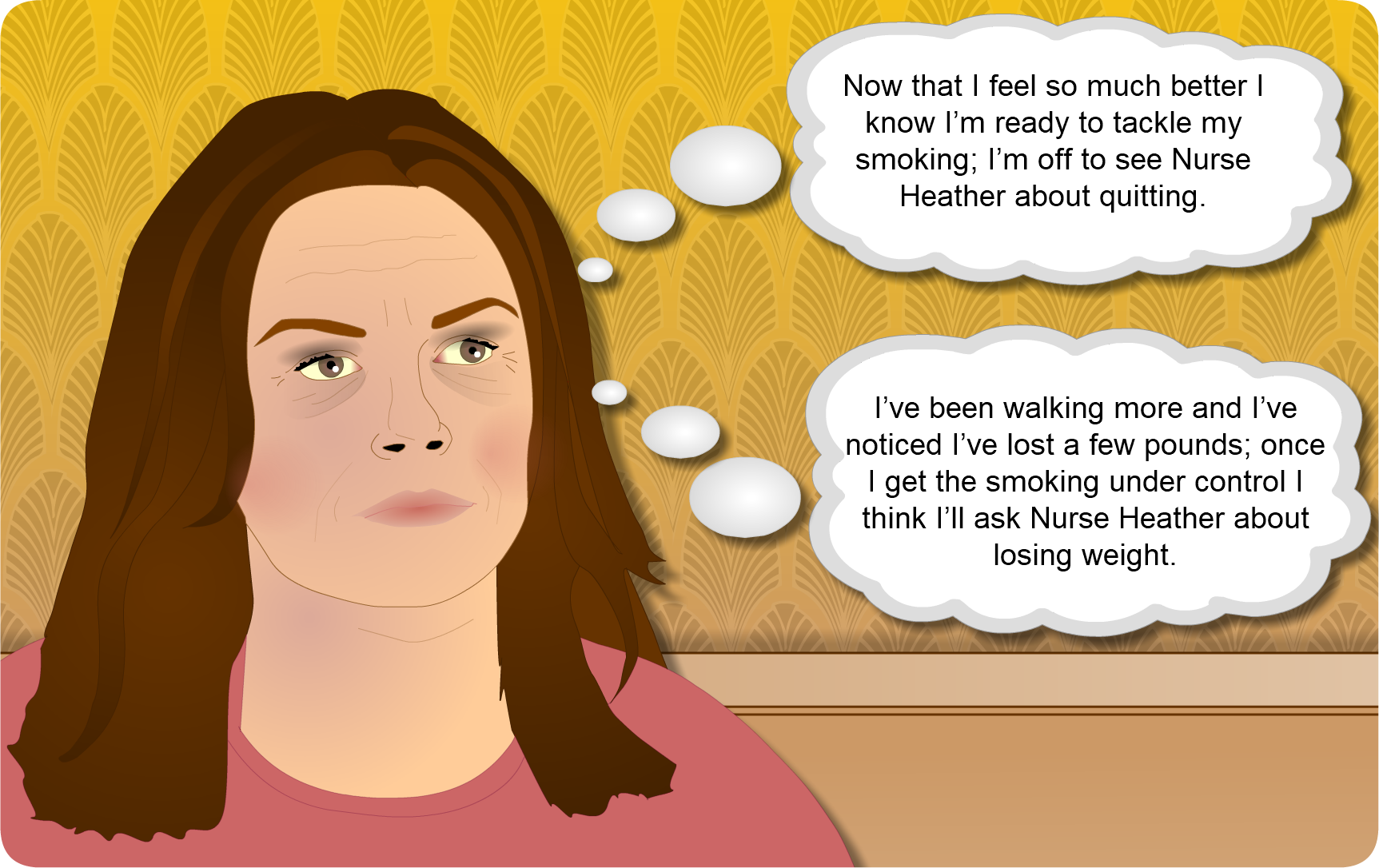Anne has a follow up appointment after her mental health assessment. Her GP prescribes her anti-depressant therapy and refers her to the local community mental health team to treat her low mood.
Anne’s sister Val agrees to look after her children so she can go to the gym and she begins to address other areas of her lifestyle. The practice nurse supports Ann’s self management strategies and signposts her as appropriate.
 Because of the risks to health, men should not regularly drink more than 3-4 units a day and women should not regularly drink more than 2-3 units a day (with 2 alcohol-free days each week). Alcohol can also be high in calories and people should be made aware of this. See the Additional Information box to see the relationship between alcohol and calories.
Because of the risks to health, men should not regularly drink more than 3-4 units a day and women should not regularly drink more than 2-3 units a day (with 2 alcohol-free days each week). Alcohol can also be high in calories and people should be made aware of this. See the Additional Information box to see the relationship between alcohol and calories.
Anne returns to see Nurse Heather in order to explore other areas of her health that she identified in the initial consultation as being preparation stage of her behaviour change. The audio below demonstrates this. It is intended as an example of a consultation in a practice using brief intervention adapted from health behaviour change (HBC) techniques.
Mental Health
Heather asked Anne the 3 NICE screening questions:
- Have you been bothered by little interest or pleasure in doing things?
- Have you been feeling down, depressed, or hopeless in the last month?
- Do you find yourself avoiding places or activities and does this cause you a problem?
Heather then followed up these questions and responses by using a recognised questionnaire used in her local area (PHQ9 for depression and GAD7 for anxiety) to assess Anne’s emotional well being.
Anne’s scores are in the moderate range for both anxiety and depression. Her main worries are anxiety and stress issues relating to money worries and with raising 2 children on her own. She is keen for support to help address these.
Suicide Risk Assessment
Anne has had thoughts of suicide in the past. She is given a crisis card with helpful numbers to ring if her mood dips.
Guidance
Heather encouraged Anne to engage in her own social support system and is pleased she is thinking of approaching the Citizens Advice Centre. She is signposted to Money Advice and given self-help information for her mood, including anxiety, stress management and sleep leaflets. Heather signposts Anne to her GP for help with her mood.
Reflecting on the consultation skills used by Nurse Heather in the audio, think about Anne’s stage of health behaviour change in order to answer the following question.
After Nurse Heather has assessed the clinical components of the consultation, she begins a further consultation with Anne. The audio below demonstrates this. It is intended as an example of a consultation in a practice using brief intervention, adapted from health behaviour change (HBC) techniques.
Press Play below to hear Anne’s consultation with the nurse.
ASSIGN is a cardiovascular risk scoring tool, developed in collaboration with Dundee University, Scotland in 2006.
ASSIGN includes social deprivation and family history of cardiovascular disease, with the classic risk factors. It identifies people free of cardiovascular disease most likely to develop it over ten years. ‘High risk’ (score 20 or more) implies risk-lowering medication and/or other medical help. ASSIGN is the cardiovascular risk score chosen for use by Scottish Intercollegiate Guidelines Network (SIGN) and Scottish Government Health Directorates.
- Age: 48
- BP: 130/78
- Cholesterol: 6.2 mmol/l :HDL 1.4mmol/l
- Smoking : 20 daily
- No significant family history
- Post code: QQ1 1QQ
Calculate Anne’s risk using the: ASSIGN tool.
Additional information
- Ht 1.68m
- Weight 85kg BMI (30)
- Waist circumference: 94cm
- Glucose 5.8 mmol/l
- Takes minimal exercise
- Drinks 10 units on a Saturday night
- Eats a lot of ready meals
- Anxious and depressed due to money worries and being single parent
- Poor social support
Key
- At risk
- Increasing risk
- Low risk
As you can see from the previous exercise, like many assessment tools, ASSIGN has limitations. It does not address physical activity, diet, alcohol or mental health issues. In addition, it does not factor in Pulse (either rate or regularity), which means that undiagnosed or unidentified atrial fibrillation would underestimate cardiovascular risk.

 Because of the risks to health, men should not regularly drink more than 3-4 units a day and women should not regularly drink more than 2-3 units a day (with 2 alcohol-free days each week). Alcohol can also be high in calories and people should be made aware of this. See the Additional Information box to see the relationship between alcohol and calories.
Because of the risks to health, men should not regularly drink more than 3-4 units a day and women should not regularly drink more than 2-3 units a day (with 2 alcohol-free days each week). Alcohol can also be high in calories and people should be made aware of this. See the Additional Information box to see the relationship between alcohol and calories.






